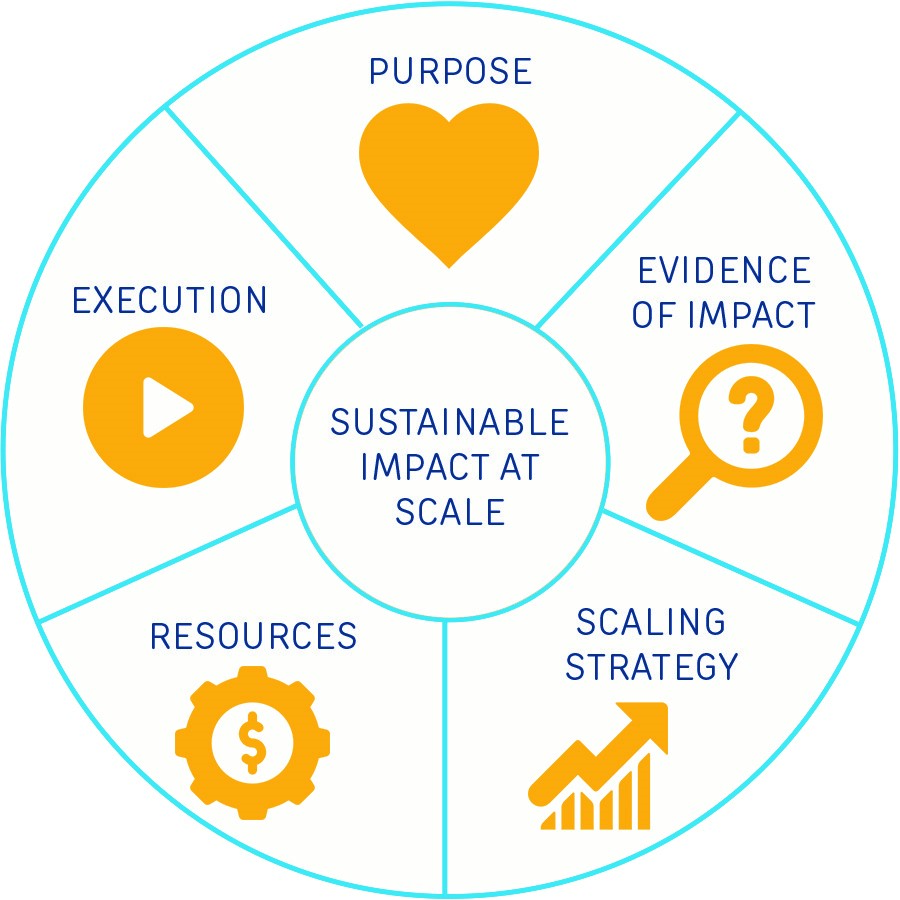Shaping the future: Our strategy for research and innovation in humanitarian response.

Shaping the future: Our strategy for research and innovation in humanitarian response.


Scaling any innovation is a difficult journey and far from an exact science. Scaling innovations in the humanitarian sector, with it’s harsh environments and complex challenges, is something we know even less about. As a part of our Accelerating the Journey to Scale initiative we have developed a tool, the Progress to Scale Framework, which helps funders and innovators in the humanitarian sector track progress to scale, and understand what support is needed for innovations reaching large scale impact.
For those who are embarking on their Scaling Journey, there are number of useful tools for innovators and funders who want to assess the scale readiness of their innovations. A simple first step can be to take the International Centre for Social Franchising’s (ICSF) 10 question Replication Readiness Test, which provides quick assessment before diving into more complex tools. The Scaling Assessment Map, developed by Ian Gray and Dan McClure, is useful to properly evaluate and start planning the scaling journey.
In the HIF’s Accelerating the Journey to Scale initiative, three promising humanitarian innovations have been selected for their potential to make a significant difference to the lives of people affected by crises. Funded by the Netherlands Ministry of Foreign Affairs, with support from the UK Government (DFID), each team has been awarded a £400,000 grant. As well as financial backing, the HIF is also providing mentorship and tailored support to help the project’s progress in their scaling journey.
To give the innovations in our programme the very best support throughout their scaling journey, we need an easy to use tool that allows us to track the awarded team’s progress towards scale. As the International Development Innovation Alliance (IDIA) argues in their paper Measuring the Impact of Innovation, scaling projects should not just be measured in terms of impact for beneficiaries, but also with regard to whether the innovator is creating the “right conditions for a continued and sustainable scaling up process”.
In answer to this need, we’ve developed the Progress to Scale Framework. The framework allows us to:
Drawing on the research and best practices, the framework is divided into five critical areas of understanding. These are the major puzzle pieces that innovators need to have in place in order to scale successfully. For each area there is a set of questions to answer as well as suggested next steps/actions. A rating is also given using a four point scale: green, amber-green, amber-red and red, which is inspired by Sir Michael Barber work How to Run a Government, to improve how central government measures and drives efficiency.
Illustration of the Progress to Scale Framework’s five areas of understanding in order for humanitarian innovations to reach sustainable impact at scale.
Sustainability is a key aspect to scaling, relevant to all five areas of understanding. As IDIA point out in their paper ‘Insights on Scaling Innovation’: “Sustainability and Scaling of innovations are closely related and need to be considered jointly”. There’s no point scaling an innovation that is not sustainable, as it will not be able to continue to deliver its impact, once scaled. The Framework allows us to look at all aspects of scaling from a sustainability point of view.
The framework is continuously evolving as we test, gather feedback, tweak and test again. We need to find the right balance to allow for the complexities of scaling, but at the same time for it to be simple and actionable enough to help guide our day to day work. The Progress to Scale Framework allows us to track and adapt our support in an agile way, as the projects navigate the twists and turns of the scaling journey.
Sharing this tool is part of our desire to generate learnings and useful tools for humanitarian innovators. It will also become part of the HIF’s Innovation Management Guide which we’re launching in 2018. We welcome all input for how we can continue to develop the framework and hope it can help unearth some of the mystery around scaling humanitarian innovations!
Author: Nora Oleskog, Innovation Management Adviser at the HIF, who leads on the Accelerating the Journey to Scale Initiative

 Please upgrade your browser
Please upgrade your browser
You are seeing this because you are using a browser that is not supported. The Elrha website is built using modern technology and standards. We recommend upgrading your browser with one of the following to properly view our website:
Windows MacPlease note that this is not an exhaustive list of browsers. We also do not intend to recommend a particular manufacturer's browser over another's; only to suggest upgrading to a browser version that is compliant with current standards to give you the best and most secure browsing experience.